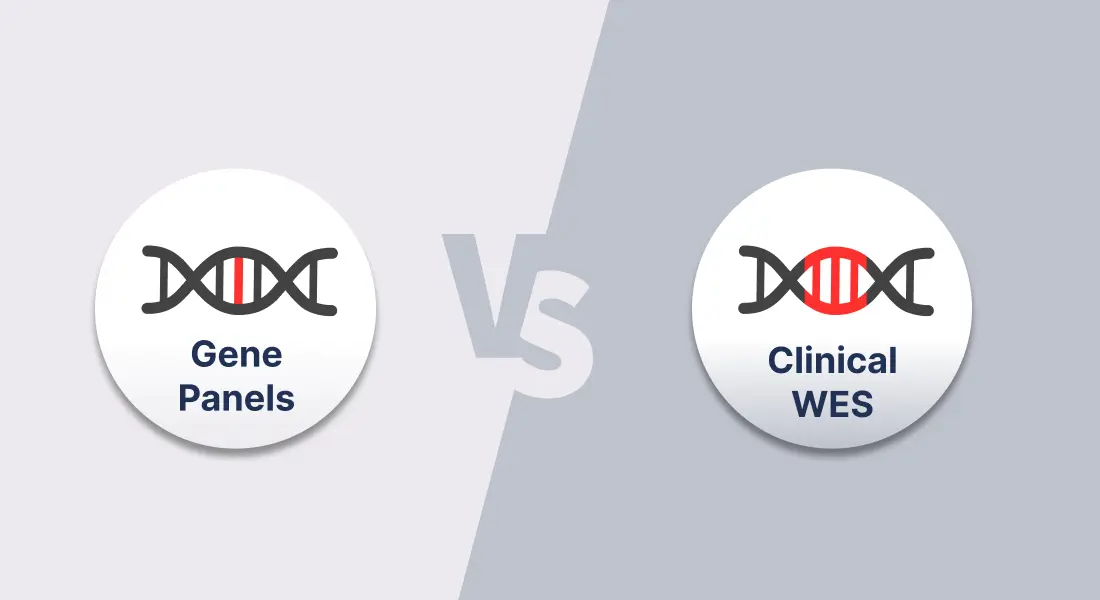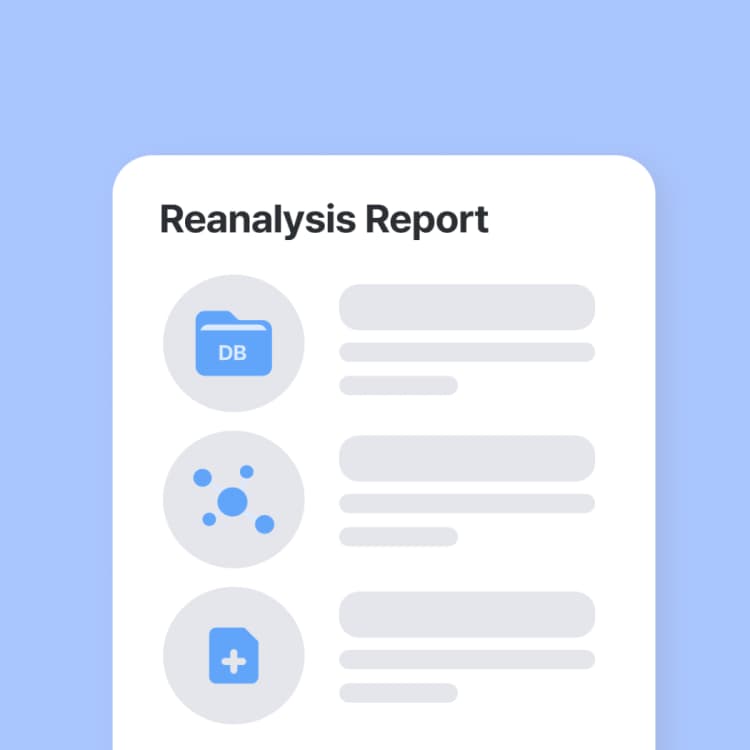Gene Panel vs Clinical Whole Exome Sequencing

In many specialties, including pediatrics, CMA alone or a gene panel sequencing for a specific single gene or set of genes has been used as a preemptive genetic testing to diagnose rare genetic disorders.
However, following this flow in all cases is not currently the most efficient or rational way for patients. Because exome and genome sequencing is now demonstrating fast enough TATs and much higher diagnostic yields to be used for clinical uses.
From now on, let’s talk about gene panel sequencing and clinical whole exome sequencing, which are two of the most common clinical applications to date.
If you are a HEALTHCARE PROVIDER and are just suggesting CMA or gene panel sequencing for your patients, this article will definitely help you to increase diagnosis rate and ensure that your patients receive efficient treatment.
Genel Panel vs Clinical Whole Exome
Gene panel sequencing involves analyzing a specific set of genes associated with a particular condition or group of conditions. These panels are designed to target genes that are known to be relevant to the specific clinical question or disease under investigation. The panel may include a few genes or hundreds of genes, depending on the purpose of the test.
Clinical whole exome sequencing covers entire protein-coding region of an individual’s genome, known as the exome. The exome comprises approximately 1-2% of the entire genome but includes a vast majority of disease-causing genetic variants.
As each has different characteristics and pros and cons, the best sequencing method for each situation may vary. From now on, let’s discuss them including indications.
Advantages
Gene Panel Sequencing
- Targeted approach: Gene panels focus on a specific set of genes, allowing for efficient testing and analysis of known disease-causing genes.
- Cost-effective: Since only a limited number of genes are sequenced, gene panel testing is generally more cost-effective compared to whole exome or whole genome sequencing if you have a clearly suspected disease group.
- Fast turnaround time: The analysis and interpretation of gene panel results are usually faster because the focus is limited to a predefined set of genes. However, the TAT for whole exome sequencing also has become fast in recent years, with a maximum of six weeks for a 3billion’s report to get to the clinician.
Clinical whole exome sequencing
- Comprehensive coverage: Whole exome sequencing provides a broad analysis of the protein-coding regions of the genome, enabling the detection of a wide range of disease-causing variants.
- Potential for novel gene discovery: Since the entire exome is sequenced, clinical whole exome sequencing can uncover novel gene-disease associations or previously unrecognized genetic causes.
- Flexibility: Whole exome sequencing can be utilized for various clinical scenarios, including cases with unknown diagnoses or patients with diverse clinical presentations.

Limitations
Gene Panel Sequencing
- Limited coverage: Gene panels are designed to target specific genes, which means that other potential disease-causing genes outside the panel may be missed.
- Incomplete information: Variants in non-targeted genes that could contribute to the patient’s condition may not be detected.
- Limited flexibility: If the cause of the condition is not known or if the condition is associated with a wide range of genes, gene panel testing may not provide a comprehensive assessment.
Clinical whole exome sequencing
- Complexity and cost: Clinical whole exome sequencing involves sequencing a large portion of the genome, making it bit more expensive compared to a each gene panel sequencing. However, if you get gene panel sequencing first unconditionally, there’s a high probability that your patients need to pay for several more tests if they don’t get clear result and need to retest.
- Incidental findings: Whole exome sequencing may uncover additional genetic variants unrelated to the original clinical question, leading to the possibility of identifying incidental findings that require further analysis and counseling. While there are mixed views on this finding, pediatrics patients and carers were generally positive about it, as it allows them to be proactive.
Indications
The choice between gene panel sequencing and clinical whole exome sequencing depends on the specific clinical indication and the suspected genetic basis of the condition.
Gene Panel Sequencing
- Well-defined genetic condition: Gene panel sequencing is often used when there is a well-defined clinical phenotype and a known association with specific genes. For example, if a patient presents with symptoms consistent with a specific genetic disorder like cystic fibrosis or hereditary breast cancer, a targeted gene panel designed to capture variants in the relevant genes can be used for testing.
- Condition with a known genetic component: Gene panel testing is suitable when there is a suspicion of a genetic component but the specific gene(s) involved are already known. For instance, in a family with a history of hypertrophic cardiomyopathy, a gene panel targeting the known genes associated with the condition can be used to identify the causative variant(s).
Clinical whole exome sequencing
- Undiagnosed or complex cases: Clinical whole exome sequencing is particularly valuable in cases where the diagnosis is unknown or there is a complex and heterogeneous presentation. It provides a comprehensive analysis of the protein-coding regions of the genome, allowing for the detection of potential disease-causing variants in both known and novel genes.
- Broad exploration of genetic causes: When the genetic basis of a condition is unclear or suspected to involve multiple genes, whole exome sequencing can be used to examine a wide range of genes simultaneously. This approach increases the chances of identifying novel gene-disease associations or previously unrecognized genetic causes.
- Assessment of incidental findings: Clinical whole exome sequencing may also be used to evaluate incidental findings, which are unrelated genetic variants that have clinical significance and are discovered while analyzing the exome data. This can provide additional information about potential health risks beyond the original clinical question.
If you need more information for specific specialties or cases, refer below articles or feel free to contact us!
- Genetic testing for inherited cardiovascular disease
- reasons patients with CA/DD/ID should get whole exome/genome sequencing tests
Curious about 3billion’s WES and WGS Service?
Get exclusive rare disease updates
from 3billion.

Sree Ramya Gunukula
Marketing Leader with experience in the pharma and healthcare sectors, specializing in digital health, genetic testing, and rare disease diagnostics.







